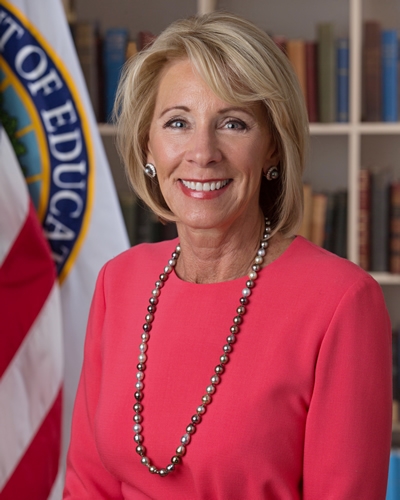You have /5 articles left.
Sign up for a free account or log in.

U.S. Education Secretary Betsy DeVos
U.S. Department of Education
The U.S Department of Education on Tuesday appeared to be on the verge of issuing an interim rule saying again that undocumented college students and others not eligible for regular financial aid couldn’t get the emergency grants created in the federal CARES Act.
But in the latest in a series of twists, turns, advances and retreats by the department as it tries to distribute the grants for colleges to hand out, the department abruptly pulled back.
The new rule wasn’t ready yet and wouldn’t be for at least a week, Justice Department attorneys representing the Education Department wrote in a filing in a federal lawsuit brought by the California community college system.
The lawyers didn’t explain, but it appeared the department had hoped the rule would be approved by the White House’s Office of Management and Budget, a necessary final step, in time to be announced Tuesday. But the interim rule is still being reviewed by the White House and hasn’t been abandoned, confirmed an Education Department spokeswoman.
It didn’t appear the delay will change the department’s stance that many students are not eligible for the grants, which are supposed to help students whose lives were disrupted by the pandemic with the cost of such things as food and housing.
M. Andrew Zee, a Justice Department lawyer representing the Education Department, said at a hearing in the California suit he had no reason to believe the department’s views would change before issuing the rule in “short order.”
The delay is the latest chapter in what’s been a lengthy and contentious attempt by the department to define who is eligible to receive the grants. Financial aid administrators say they’ve been confused about who can receive them, slowing the money from getting to some students.
“I can’t remember the last time schools experienced this much implementation whiplash,” Justin Draeger, president and CEO of the National Association of Student Financial Aid Administrators, said Tuesday, after the department backed off on issuing the rule.
“I think ED got out over their skis vis-à-vis the administration's clearance process,” said Daniel Madzelan, the American Council on Education’s assistant vice president for government relations and public affairs.
After U.S. Education Secretary Betsy DeVos initially said colleges would have wide discretion on whom to give the grants to, the department angered many when it later said in an FAQ document on its website that only those eligible for regular student aid could get the grants. That excluded not only undocumented students, but veterans who rely on the GI Bill instead of regular student aid to go to college, as well as millions of others disqualified from regular aid for reasons like having bad grades.
Democrats, as well as associations representing higher education institutions, charged that DeVos’s interpretation violated congressional intent, which the department denies. The California community colleges and the Washington State attorney general are challenging the interpretation in separate federal lawsuits.
The department confused colleges further when it announced three weeks ago that its guidance on the website is not legally binding, and as such, the lawsuits should be dismissed.
This week, though, the department was apparently about to issue a rule that would be legally binding. The department in a regulatory filing on Monday said it planned to publish a final interim rule Tuesday, which would be effective when it appeared in the Federal Register.
The filing did not say what the final rule would have said, but it gave strong hints it would be along the lines of limiting who is eligible for the grants. It said Congress in the CARES Act did not define eligibility, but the department’s interpretation is that only those currently eligible for regular aid can get the grants.
Without approval by the Office of Management and Budget, a division of the White House, the filing said the "department will not be able to implement our interpretation of the CARES Act and institutions may continue providing financial assistance to students that does not comport with the department’s interpretation of the CARES Act.”




